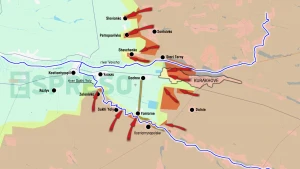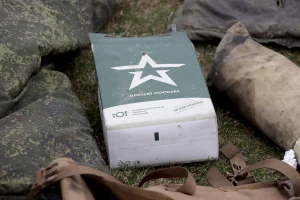
US, EU and 12 other countries support Kyslytsia's statement on hostile shelling of Kherson during evacuation of residents
The United States, the European Union, and 12 other countries supported the statement by Ukraine's Permanent Representative to the UN, Sergiy Kyslytsia, on the shelling of Kherson as residents of the flooded areas were evacuated after Russia blew up the Kakhovka HPP
This was reported by the Voice of America.
In particular, representatives of Albania, Estonia, France, Germany, Italy, Lithuania, Latvia, Japan, Malta, Poland, Sweden, and the United Kingdom joined the support.
In the statement, Kyslytsia condemned the actions of the Russians who began shelling the city of Kherson during the evacuation of civilians from flooded areas. According to the city authorities, at least nine people, including police officers, medical workers, and rescuers, were injured as a result of the enemy's attacks.
After that, Ukraine, the United States, the EU, and 12 other countries condemned the Russian shelling of Kherson. They called on Moscow to stop the attacks and allow evacuation teams to help the victims.
The statement also called on Russia to provide humanitarian organizations with free access to the areas affected by the water spill on the left bank of the Dnipro River and currently under Russian occupation. Access to these areas will allow the UN and the International Committee of the Red Cross to help the victims.
Kakhovka HPP explosion: statements from the world
On June 6, Russian occupation forces blew up the Kakhovka HPP, completely destroying it. As a result of the tragedy, settlements in the Kherson region and the regional center itself were flooded, and there are reports of flooding in the Mykolaiv region, as well as in the Dnipro region, and which caused a massive fish pestilence in the Zaporizhzhia region. For a detailed account of the situation, click here. More news about the situation related to the hydroelectric power plant explosion can be found here.
The New York Times, citing engineering and munitions experts, stated that the most likely cause of the destruction of the Kakhovka dam was an explosion from within. Natalia Humeniuk also stated the possibility of an internal explosion. According to her, the invaders are trying to stop the Ukrainian Armed Forces' counteroffensive.
For his part, Volodymyr Zelenskyy emphasized that Russia mined the dam last year and Ukraine was ready for the explosion. In addition, Zelenskyy discussed the consequences of the HPP explosion and the risks to ZNPP with the IAEA director and invited him to Ukraine.
After that, British Prime Minister Rishi Sunak said that the UK intelligence services were investigating Russia's involvement in the Kakhovka HPP explosion.
Speaking to Ukrainian President Volodymyr Zelenskyy, his Turkish counterpart Recep Tayyip Erdogan said that a commission should be set up to investigate the explosion at the Kakhovka hydroelectric power plant in detail, with the participation of experts from Ukraine, Russia, the UN, and the international community. Meanwhile, in his evening address on June 7, Zelenskyy mentioned the conversation with Erdogan from a slightly different angle.
Foreign Ministry of Ukraine responded to Turkey's proposal by reminding that the UN mission to investigate the strike on the colony in Olenivka, where Ukrainian prisoners were held, had been "quietly closed."
In turn, the US presidential administration expressed its opinion. Biden's team blames the Kakhovka HPP explosion on Russia, whose occupation forces have controlled the dam and the area for a long time.
The North Atlantic Treaty, on the other hand, believes that the destruction of the Kakhovka HPP was the result of Russia's invasion of Ukraine.
As early as June 8, Ukraine and the UN agreed to organize teams to evacuate civilians from the occupied left bank of Kherson region as soon as Russia grants access. At the same time, Ukraine's Permanent Representative to the UN, Sergiy Kyslytsia, said that it was impossible to investigate the undermining of the Kakhovka HPP due to the occupation and lack of cooperation with the occupying authorities.
- News














































